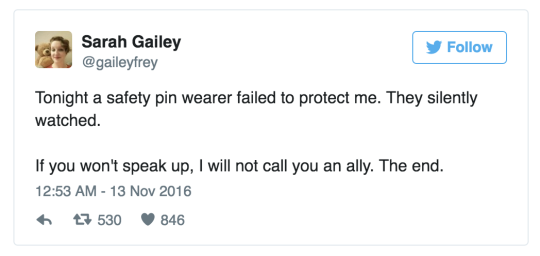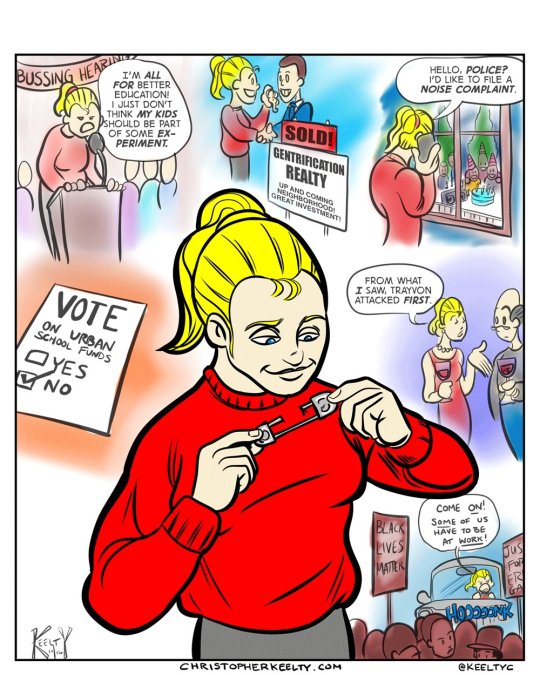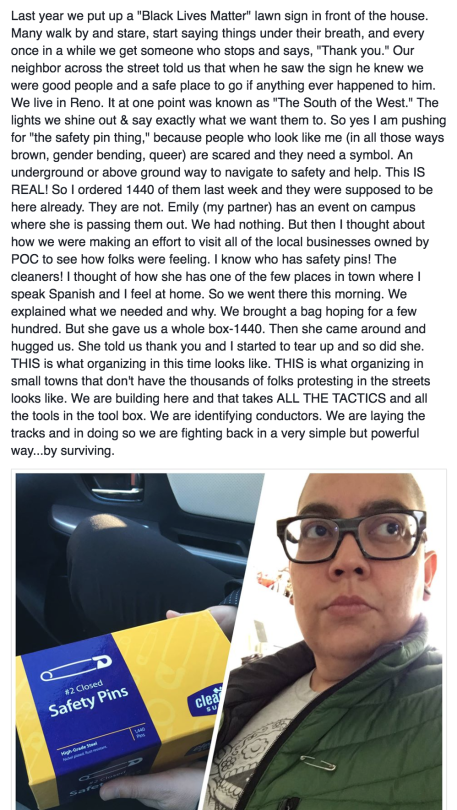why the safety pin backlash makes me sad
19 Nov 2016last week, a bunch of people started wearing safety pins in solidarity against hate. it’s a gesture that was borrowed from brexit (here’s an article explaining a bit of the history and long-ass snopes piece, too). the general idea is that the safety pin is a symbol that says “you’re safe with me.” my sense was that it was a gesture for people who wanted to show that they aren’t down with trump’s bigotry and the increasingly public hate for oppressed folks.
i actually heard a story where it worked. a women wearing a hijab was being harassed on a train. she saw someone else on the train wearing a safety pin. she walked over to stand by the person wearing the pin. the harasser stopped.
that said, as the internet does, the critique began to create more energy than the pins themselves. there was a small war in my facebook feed about whether or not people thought it was a good idea.
this article is indicative of the backlash, but there are many others (including this which is actually the best overall coverage of the phenomenon i’ve see so far).
to be clear, the point i’m getting working towards in this piece is a system one. people are allowed to be as angry as they wanna be at whatever they want. anger policing is oppression. full stop. but bear with me…
i’m gonna be a little blunt because i’m writing fast, but basically, my perception was that it seemed like more radical people shat on the less radical people. “i see you wearing that safety pin but if you’re not also down with my cause and my framing of my cause then fuck you and your symbol because you’re fake and weak.”
now i do see a point in that the pins as a symbol could actually backfire for the people who are increasingly the targets of explicit hate. in the best case scenarios, things like this tweet can happen:

in a worse scenario (because why not just be straight out with it), if the woman from the story earlier had walked over to the safety pin person, but then that person was actually a trump supporter and hurt her… like… fuck.
but MOST people i saw backlashing didn’t say that. i mostly just saw people say this:

now i’m seeing people say that they were interested in wearing the pins, but have decided to stop. i’ve totally stopped seeing them on the trains.
this hurts me real deep because i’m thinking about strategy and winning. if the effect of people wanting to show solidarity is rejection with anger and critique, how the fuck are we supposed to get them to take even more radical steps? (which is what’s needed to break down all these oppressive systems we’re all drowning in).
on an alternate note, my friend, felicia, posted an amazing note about the value of the safety pins for people organizing outside of cities:

i wish people had organized some active bystander trainings and harnessed the energy of the safety pin crowd to move us all forward (i guess i should do that if i’m over here complaining about it… i hear mit has some resources for this…). not only did we miss an opportunity, now instead we have even more division and a whole new wave of people who have learned to stay silent and do nothing (which is less than wear a symbol) because even their well-intentioned efforts get them attacked (similar to the starbucks #racetogether backlash).
hurt people hurt people. literally everyone has the right to be angry about whatever they want. but from a strategic standpoint, i’m not sure how any of us people who are in the sights of an increasingly explicitly white nationalist government are going to survive if we can’t constantly be building power.
=\
resources